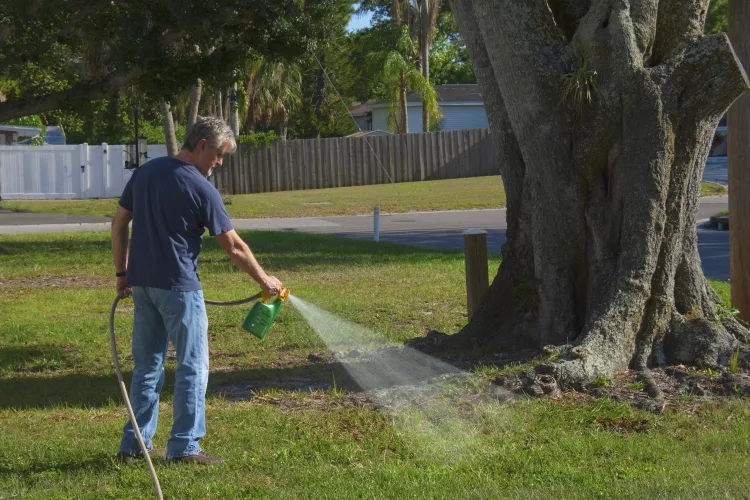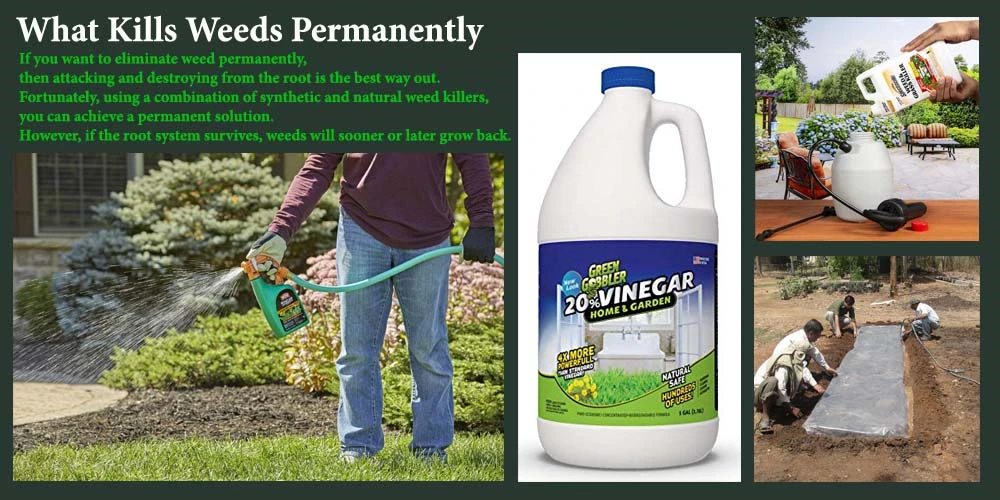reviewed by Truman Perkins
Gardening, whether on a small scale or commercially, can sometimes be challenging. Maintaining healthy balanced soil is excellent for growing crops while also creates a space for weeds to thrive. The outright truth is that homeowners constantly fight unending battles with weeds regularly. Therefore, every gardener would want to know what kills weeds permanently.
If you want to eliminate weed permanently, then attacking and destroying from the root is the best way out. Fortunately, using a combination of synthetic and natural weed killers, you can achieve a permanent solution. However, if the root system survives, weeds will sooner or later grow back.
Contents

Weed is wild unplanted, and unwanted vegetative, which grows in the farmyard, competing with plants or crops you want to keep. The weeds pop up and, like a parasite, deprive your plants’ essentials, like water, nutrients, and sunlight—these results in the plants growing weaker, stunted growth, and delayed maturity.
Some weeds are perennials, while others annuals. Perennial weeds are tolerant, and their life cycle can be over one year. The perennials weeds have a strong root structure thus keeps regrown after cutting. Annuals only live for one year and spread their seeds for the subsequent years. However, they are easier to kill as compared to perennials.
While there are various innovative ways of eliminating weed, some control methods are weed-specific. Still, there are herbicides in the market which wipes weeds but leaves plant intact and undamaged. However, it is recommendable you exercise cautiousness when choosing weed control methods. Some weed control plans may either affect your plants or the soil structure and composition.
Pure Vinegar is a crucial weed killer that dries the plant from leaves to the root system. It works by stopping hydrogen distribution, thus drying the entire weed. Vinegar uses acetic acid as a drying agent and is especially effective on young, immature plants. However, take precautions when applying Vinegar because a splash can burn your plants too. Adding salt and dishwashing soap solution to Vinegar can make the effect ideally permanent.
One of the most classical weed killer methods is water-based. An example of these is Boiling water and steam, which kills weed using rapid heat. It is an effective method that burns leaves and roots, killing the weed in 24 hrs. For best results, specially grown weeds, the repeated application is needed.
Another natural and effective drying agents are fatty acid-containing products. These options may also include a combination of fatty acids and acetic acids. They usually work by dissolving membranes, thus causing dehydration and kills the plant. Fatty acids such as salt lead to a permanent weed control solution when used for a longer time.

Of course, chemical spray is the most effective weed control option. Some chemicals-based weed elimination products work ideally, depending on the type of weed. With the developing technology, now there are chemical weed killers which work more selectively. It means you can wash your plants but selectively kills weed leaving the plant unaffected. Some weed killers can eliminate all sorts of weeds and leave flowers, fruits, herbs, and veggies healthy.
There are permanent weed controller chemicals like roundup, which kills every weed species from broad leafy to grassy. They kill from leaves, and the effects run down the roots due to the impact of glyphosate. If it gets in contact with the flowers and crops will eliminate that too; hence, careful handling is needed.
Soil solarization is a natural, chemical-free way that eliminates unwanted invasive weeds and grass. Pretty sure, unlike other methods, solarization offers a permanent weed control resolution. The solarization process comprises covering the surface with a plastic material to trap sun energy that heats the soil. Usually, it works best with transparent polythene than black or white plastic. A significant advantage of this method not only eliminates weeds but also kills pests, bacteria, and fungi.
Baking soda is famous as a naturally effective weed killer. Like Vinegar, baking soda works by absorbing all the moisture from the surface of the weeds, leaving them dry to die. Spreading just a little baking soda is sufficient to eliminate any plants it gets in contact with. This option works nicely on a wet surface. Therefore, it means for best performance, start by sprinkling water in the surrounding you want to eliminate the weed. Then sprinkle a teaspoon of baking soda, and all the grassy weeds or so will be no more.
Actually, in most cases, after the weeding process, sooner or later, weed comes back. However, technology has formulated pre-emergent chemicals that are used after weeding to prevent weeds from coming back. Luckily, some fertilizer manufacturers add pre-emergent elements and other nutrients to top-dressing fertilizers.
Additionally, there are pre-emergent herbicides that are also sprayed to the vegetable garden and flower to kill new weeds and returning ones. Heavy mulching is another practical step of preventing weeds from returning by closing all the gaps left b taller plants.
So mulching is a required method that deprives the weed of sunlight or space for thriving and helps preserve water. Eliminating weed within a large area of vegetation is also very easy. You cover with cardboard, plastic materials, wet newspaper, etc… This will also bar fresh air from reaching the weed.
Weeds are an absolute nuisance to all gardeners, beginners, and experts alike. While it is possible to eliminate grass and other weeds somehow, permanently killing them is rather challenging. Choosing any of the above weeds elimination strategies and sticking to them can save much of your effort. However, if you aim for total elimination, find a way to destroy the root structure of the weeds.
Natural home remedies are safer methods of weed elimination because they do not disrupt soil structure. Some of them promise faster and reliable somehow, but you cannot rely only on natural plans. Maybe after performing weed elimination, you can follow up with re-emergent chemicals to achieve better results.
 |
 |
 |
 |

About Truman Perkins
Truman Perkins is a Detroit-based SEO consultant who's been in the business for over a decade. He got his start helping friends and clients get their websites off the ground, and he continues to do so today. In his free time, Truman enjoys learning and writing about gardening - something he believes is a natural stress reliever. He lives with his wife, Jenny, and their twins in Detroit.
 |
 |
 |
 |
Check These Out
Get new FREE Gifts. Or latest free growing e-books from our latest works.
Disable Ad block to reveal all the links. Once done, hit a button below
 |
 |
 |
 |